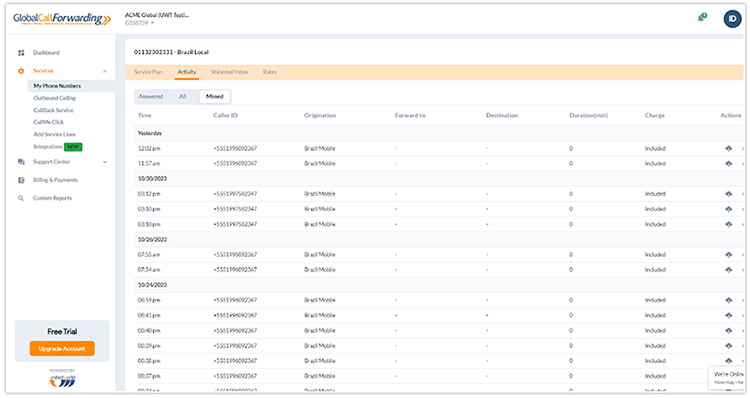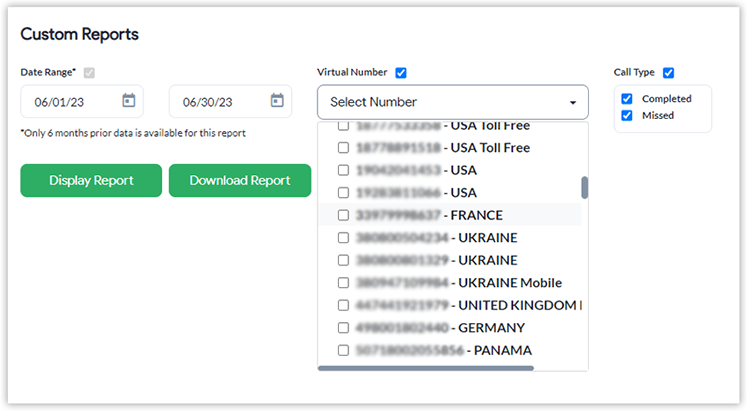While self-service and omnichannel options gain popularity, about 78% of contact centers continue to have high or medium usage of phones. This means that most customers call the business for sales or product assistance. So, what happens when these calls don’t make it through?
Missed calls can contribute to negative caller experiences. They can significantly affect customer satisfaction by signaling unavailability or indifference, hindering issue resolution, and affecting business goals. Each missed call is a lost chance to connect with customers. Tracking and identifying them helps turn missed opportunities into potential sales or client retention chances.
Let’s look at the impact of missed sales calls, their business potential, and how to avoid them.
Why Missed Calls Matter
In a competitive market, unanswered calls imply unavailability, leading to customer frustration. They slow response times, impact sales call metrics, and diminish customer satisfaction. Besides leading to potential revenue loss, they can also affect your brand reputation.
Let’s understand the impact of missed calls on your sales goals, the causes of missed calls, and how to track them.
Impact of Missed Sales Calls
Customers continue to favor phone calls for speedy solutions. Missed calls are missed opportunities where your teams could have provided excellent customer service, improved satisfaction, and increased retention.
And if phone calls are your primary communication channel, then your customers have no other way of connecting with your business and getting their issues resolved. This will only encourage them to seek better service elsewhere.
Moreover, phone calls allow customers to share their thoughts openly, offering valuable feedback for product and service improvement, surpassing online interactions in understanding.
So, failing to respond promptly can make customers unhappy and frustrated, ultimately pushing them away.
What Causes Missed Calls?
Overwhelmed teams, short office hours, lack of off-hours service, and poor call quality are some of the reasons likely to cause missed sales calls. You can address these issues by improving workforce management, call prioritization, and refined call routing systems among other things. Let’s look at each in more detail:
1. High Call Volumes
Fluctuating and high call volumes can overwhelm available staff, leading to more incoming calls than your teams can manage. This imbalance means longer wait times for customers or that calls inevitably go unanswered. Your business may experience this during peak seasons, certain times of day, or when your teams are short-staffed.
2. Short and Incompatible Office Hours
Limited office hours can restrict customer access to the business. If they can’t call within your business hours or their schedules don’t align with your teams, it could lead to missed connections.
For instance, when crucial sales team members have overlapping lunch breaks or your teams don’t cover all time zones, there might be a period when calls go unanswered.
Luke Genoyer, Business Development Manager at Global Call Forwarding, highlights the challenge of covering all hours when having sales offices across different time zones. The most noticeable global gaps occur during West Coast business hours (after 6 PM EST) and EMEA business hours. He adds, “These time slots often fall outside typical US office hours, making it difficult for customers to reach the sales team.”
3. Limited Service Teams
Building on the above point, when catering to a diverse range of time zones, having ample staff available 24/7 is crucial. Staffing shortages or limited service teams, especially when it comes to international calls, lead to challenges in managing call volumes while increasing the number of unanswered calls.
4. No Off-Hours Service
Customers often require assistance beyond regular business hours. This is especially true if you receive calls from international customers in only one or two service centers. So, if you have incompatible business hours and don’t provide after-hours support, you reduce the chance of these customers connecting with a team member.
5. Unreliable Phone Service
Goes without saying that an unreliable phone service poses a barrier to effective communication with customers, causing dropped and missed calls. If you have a low-quality VoIP service and inadequate internet bandwidth, you may experience call quality and routing issues.
Most VoIP providers route calls using the Least Cost Routing (LCR) method. LCR is about finding the cheapest way to route phone calls by choosing paths based on the lowest rates. While this can help reduce communication costs, it can often lead to low-quality audio and lower connection rates. LCR uses outdated technology which causes issues like distorted audio, calls not connecting, and at times, missed calls.
“To maintain high call quality and proper termination, we use multiple locations and work with local carriers even though it needs more work and contracts on our part,” says Luke explaining the Global Call Forwarding network.
6. Low Call Quality
Subpar call quality disrupts your ongoing interactions. Technical problems such as static, dropped calls or unclear audio can make customers hang up without completing a purchase or inquiry. Moreover, if the audio is muddled, important information could get lost, causing misunderstanding or overlooking of details necessary for completing sales transactions. Low call quality, long connection times, and related technical problems can also directly result in abandoned and missed calls.
7. Ineffective Call Management Strategy
Above all else, an inefficient call management strategy often leads to a significant number of missed calls. The direct consequences of such a strategy may include insufficient or unoptimized staffing, ineffective call routing, and unclear call prioritization methods.
How to Track Missed Sales Calls?
Now that we know call management is vital for improving business communications and operations, we can look at how to track calls. There are several methods that aid in tracking calls. Call activity, custom reports, and analytics provide insights you can use to optimize call routing, staffing, and call handling and increase call answer rates.
1. Call Activity
Call activity helps you track all incoming and outgoing calls made to your business phone number. It displays details of answered and missed calls. You can use this to see call history and understand the chronology and frequency of missed calls over time.
If you are a Global Call Forwarding customer, you can easily access your business call activity through our intuitive online control panel.

2. Custom Reports
Most providers offer call reports or analytics that you can tweak to get custom reporting that meets your needs.
For example, Global Call Forwarding customers can create custom call reports for granular details on their virtual phone number usage. This feature turns raw call data into actionable insights that you can conveniently download and analyze with tools like Excel.

3. Call Analytics
Apart from providing data to help you streamline marketing efforts, call analytics can help in tracking and analyzing missed calls. Using this feature, you can delve into the specifics of each call, including caller details, geographic location, and marketing channel effectiveness. Additionally, Call analytics provides insights into customer behaviors, preferences, and the success of marketing campaigns.
Related: What is Call Analytics?
How to Avoid Missed Calls and Turn Them into Opportunities
When it comes to handling missed calls, prevention is key to seizing opportunities. By setting up rules and strategies proactively, you can prevent missed calls and effectively convert them into avenues for growth.
Here are some practical approaches to improve your communication system and make the most out of every call:
1. Use Advanced Call Routing Strategies
To ensure customers quickly connect with the right people and available resources, you can use call routing and IVR systems. Set custom rules and send calls to different destinations, devices, channels, or self-service options. For instance, the IVR system routing avoids missed calls by quickly guiding callers to the right (or available) department or providing desired information through automated menus.
This way, you can prepare in advance to send calls to teams located globally or to smartphones when people aren’t in the office space.
- Some common routing strategies to ensure better coverage and response customer service include:
- Simultaneous ringing – ring multiple phones simultaneously.
- Sequential forwarding – forward calls sequentially to different agents, one after the other.
- Time-based routing – forward incoming calls based on the time of the day.
- Business hours – Route calls to different locations or numbers during and outside of business hours.
- Find-me-follow-me – route calls to your office phone, if no answer, to your cell phone, then to a voicemail or answering service.
- Voicemail forwarding – if the call just can’t be answered, set up an option to send calls to voicemails as a backup plan. These voicemail messages can be transcribed and emailed to recipients.
By directing calls to the best destination at all times, you can deliver quality customer service even during peak times.
Related: 9 Benefits of Advanced Call Routing
2. Responsive Callback
Responding promptly to missed calls is crucial in converting them into sales opportunities. Several service providers like Global Call Forwarding provide the option to see missed calls in real-time, enabling rapid action. Train your sales teams to keep an eye on call reports and activity. “Basically, you want to be on top of these missed calls and get back to your customers as soon as possible,” explains Luke.
In fact, you can take this a step further by ensuring your salespeople can call customers back from the same numbers the customers originally called. So, instead of returning calls from unknown numbers, sales teams use our outbound calling service to display their business number as the outgoing caller ID.
3. Manage High Call Volume
It is clear that when call volumes surge unexpectedly and your teams are not prepared to handle them, customers might wait too long, abandon calls, and generally have a bad experience. You can work around this challenge by planning ahead for busy times and utilizing routing features like failover forwarding or voicemail-to-email.
Related: 13 Ways to Manage High Call Volume
4. Provide Off-Hours, 24/7 Service
Offering off-hour service ensures round-the-clock accessibility, minimizing missed calls and maximizing customer satisfaction. But how can you make your business available to customers 24×7?
One way to do this is by utilizing the Follow the Sun customer service model. It works by having teams in different locations and time zones and routing calls based on these time zones’ busiest hours. This way, there’s always a team available to quickly answer customer queries, no matter the time of the call.
By providing continuous support you can reduce the chances of calls going unanswered even during your off-hours. And this, in turn, reduces the likelihood of missed opportunities.
5. Prepare with Analytics
Use call handling features like analytics, logs, etc. to identify patterns related to missed calls and make staffing adjustments accordingly. Moreover, study call patterns to gain insights on improving response times, enabling proactive measures to handle missed calls efficiently.
6. Switch to a Reliable VoIP Phone Service
Finally, to put the above strategies in place, you’ll need a cloud phone service capable of handling your business’ communication needs. A reliable VoIP service provider offers stable call quality and a variety of call management features.
Global Call Forwarding customers can benefit from an array of call routing and international forwarding features as well as IVR, auto-attendant, voicemail to email, and more. This will help you build a strong phone system optimized for call management so your teams can avoid missed calls and respond to customers faster.
Reduce Missed and Abandoned Calls with Global Call Forwarding
The impact missed calls have on customer satisfaction, sales goals, and brand reputation cannot be stressed enough. With advanced call handling tools and features, you can tactfully mitigate missed call occurrences.
Global Call Forwarding empowers businesses to improve customer interactions with advanced call management tools. Leverage our expertise and take proactive steps towards building a modern business communications system.
Visit our website and contact us today to learn more about call handling strategies and maximizing your business potential.


